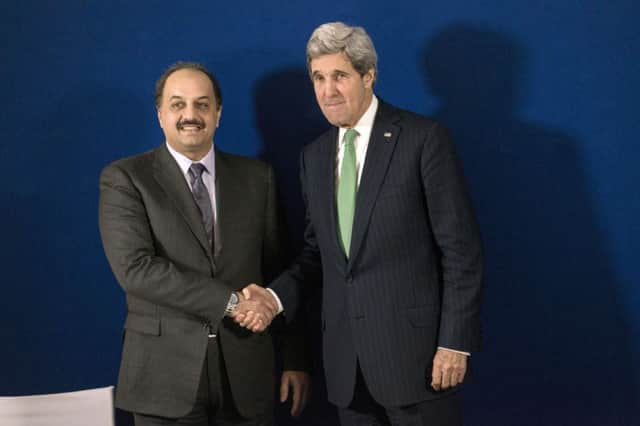John Kerry in face-to-face Iran nuclear deal talks


In a sign of the thawing climate between the Islamic Republic and the West, Iran’s Mohammad Javad Zarif said he had held bilateral talks with US secretary of state John Kerry, as well as with other ministers from the six powers negotiating with Tehran, during a three-day security conference in Munich.
His talks looked forward to negotiations starting in Vienna on 18 February when Iran and the six powers will attempt over a period of six months to build on an interim agreement on Tehran’s nuclear activities to reach a definitive deal.
Advertisement
Hide AdAdvertisement
Hide Ad“What I can promise is that we will go to those negotiations with the political will and good faith to reach an agreement because it would be foolish for us to only bargain for six months,” Mr Zarif told the conference.
“That would be a disaster for everybody – to start a process and then to abruptly end it within six months,” he said after his meeting with Mr Kerry, who also pressed Mr Zarif on Iran’s role in helping to end the conflict in Syria.
Iran insists its nuclear programme is entirely peaceful but Western countries have long suspected Tehran of seeking the ability to develop a nuclear weapon.
Under a landmark preliminary deal with the United States, Russia, China, Britain, France and Germany sealed last November, Iran agreed to halt its most sensitive nuclear operations in return for winning some relief from sanctions. Mr Kerry stressed to Mr Zarif the importance of both sides negotiating in good faith and of Iran abiding by its commitments.
The US and the European Union have suspended some sanctions on Iran under the interim deal, but Mr Kerry told Zarif the US would continue to enforce other sanctions.
Mr Zarif said Iran was ready to address important outstanding questions in the nuclear negotiations but added there was still a lack of trust on both sides, including mistrust among Iranians about the West’s intentions.
He held out an olive branch to Saudi Arabia, Iran’s regional rival, saying he was ready for talks at any time.
“I believe Iran and Saudi Arabia share a common interest in a secure environment,” he said. “Neither one of us will benefit from sectarian divisions, neither one of us will benefit from extremism in this region … We can work together in order to have a safer neighbourhood. There is no need for rivalry.”
Advertisement
Hide AdAdvertisement
Hide AdThe head of the United Nations’ nuclear watchdog, Yukiya Amano, said possible military dimensions of Iran’s nuclear programme needed to be clarified and he said his agency also wanted to clarify the issue of small amounts of polonium-210 that had been produced by the Tehran research reactor.
“Polonium can be used for civil purposes like nuclear batteries but can also be used for a neutron source for nuclear weapons,” he told the Munich conference.
Iran sealed a cooperation pact with the International Atomic Energy Agency last November.
Swedish foreign finister Carl Bildt, who is due to visit Tehran soon, urged Iran to “come clean” on its past nuclear activities, saying some intelligence agencies believed Iran had had a nuclear weapons programme until early 2003.